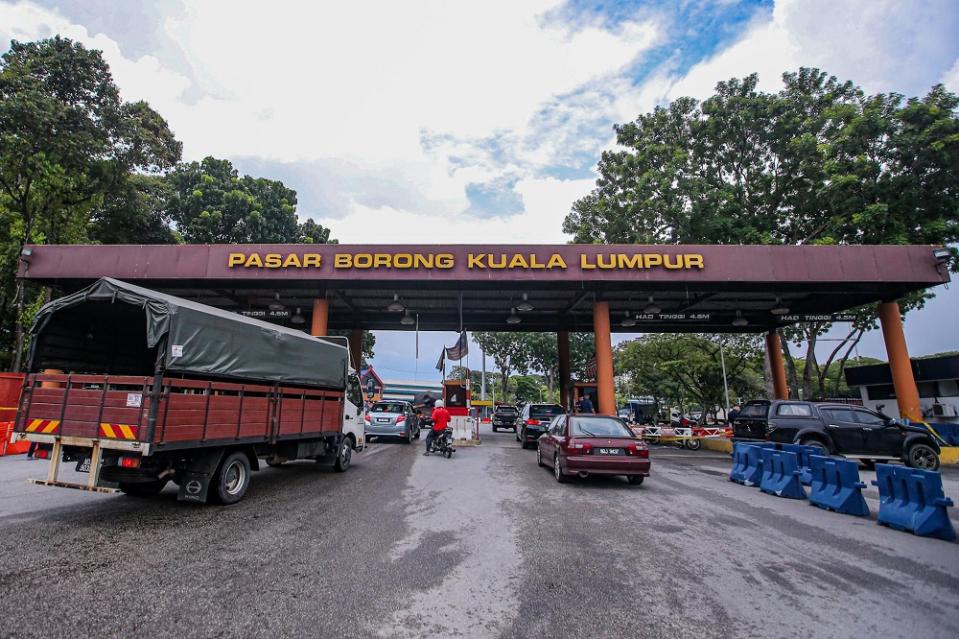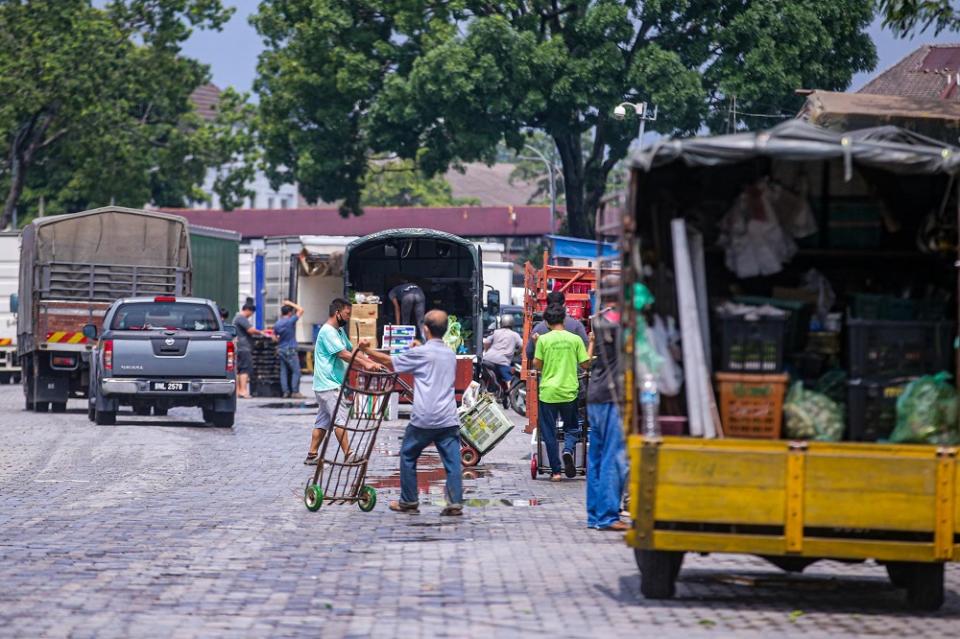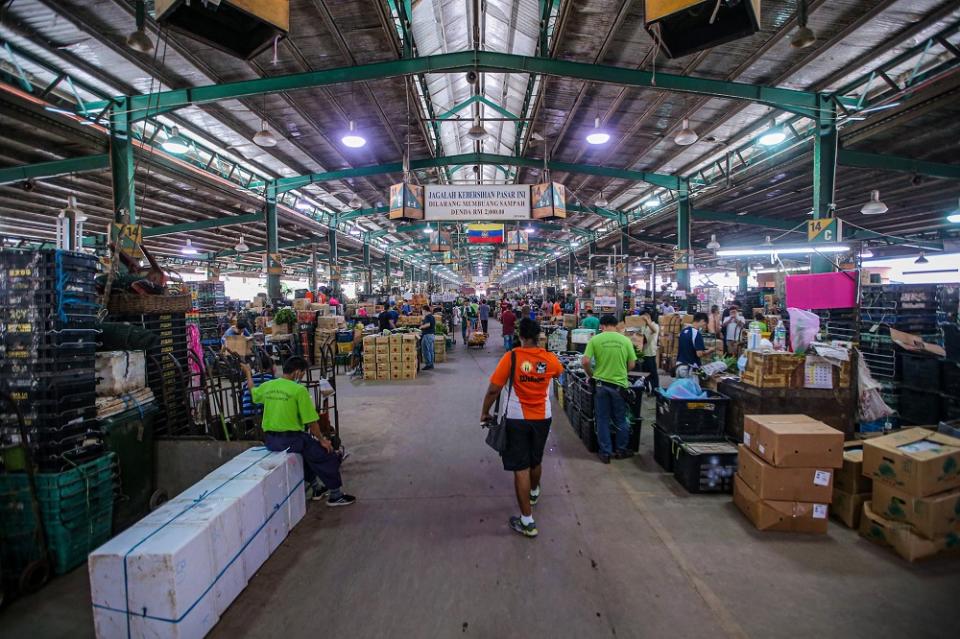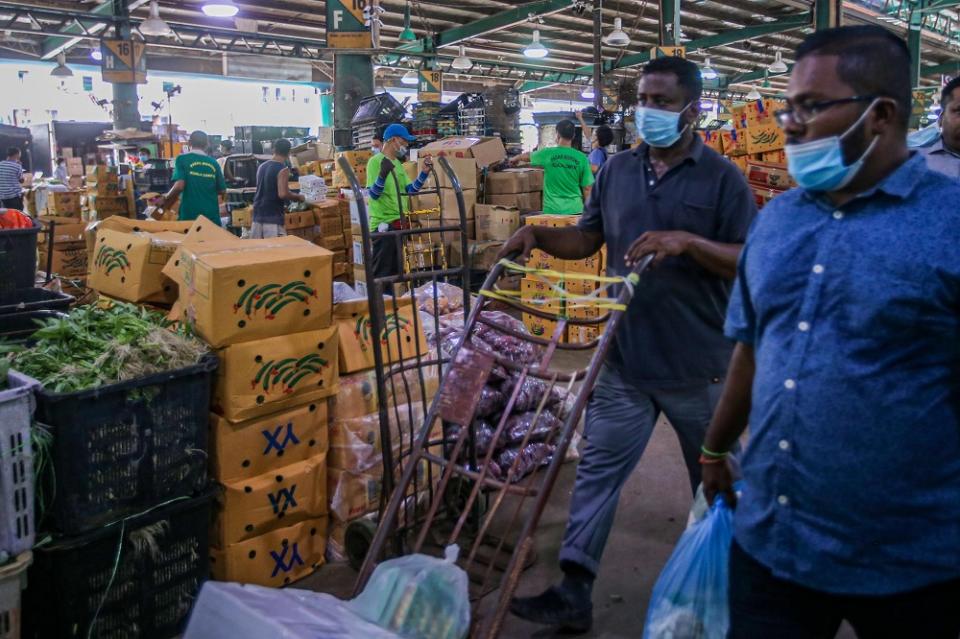Bigger business, robust network: Why local traders feel DBKL ban won’t root out ‘illicit’ foreign market traders

KUALA LUMPUR, July 6 — During the movement control order (MCO), foreign workers lost their jobs after they were forcibly pushed out of the Kuala Lumpur Wholesale Market in Selayang, but this has not stopped them from trading.
Even facing a ban by the Kuala Lumpur City Hall (DBKL) against foreigners entering the market, foreign traders still persevere and continue to conduct their business outside the premises, to the complaint of local traders.
The area outside the market was a hive of activity with forklifts moving produce, delivery trucks lining up the street, with both locals and foreigners making enquiries and bargaining on price and product availability and loading and unloading work taking place throughout the morning.
Wholesalers lined both rows of shops as fresh produce was displayed on the front, with the rest stored in the back or on makeshift freezers to keep the produce fresh.
Trucks were seen going in and out throughout the morning, most of them dropping off their load while other empty trucks were seen being loaded up.
The entrance to this area was also guarded by police who stopped cars going in to check who they were although no temperature checks or details were jotted down.
Several local vendors at the market have now claimed that they are losing business to migrant traders, even accusing the authorities of taking a lackadaisical approach in enforcing the ban.
“The Federal Territories minister doesn't know that every day when City Hall conducts their checks they are paying more attention to people working inside the market premises but not outside.
“This is a legal wholesale market and only those with proper documentation can work here but these foreigners who aren’t allowed in here and are operating outside the market are not being checked or apprehended by the authority,” said a fruit seller who wished to go by the name of Chee.
The Kuala Lumpur Wholesale Market, otherwise known as the Selayang wholesale market, was closed on April 21 to prepare for Covid-19 screenings for everyone operating in the market.

The government had put areas surrounding the market under the enhanced movement control Order (EMCO) to conduct mass Covid-19 screenings of the 16,000 in the area, 90 per cent of whom are foreign nationals.
Four days later the marker reopened but many of the traders vented their frustrations at having lost job opportunities at the market due to the large number of migrant workers, some who had even become bosses, who had taken over running the businesses.
Following the recent crackdown on undocumented migrants, FT Minister Tan Sri Annuar Musa insisted he wants to see an end to foreigners working in wholesale markets, especially following intense public backlash against the community.
Annuar had told the business owners to hire locals when they reopened. As of last week, there were more than 1,000 locals working in the Selayang market.
Those that were forcibly replaced are now simply operating outside the market.
“If they want to sell retail fine, but wholesale cannot because they don’t have permits to do so. I doubt the outside sellers have permits for wholesale.
“Despite that you will see forklifts going around outside carrying items to their stalls. Their business is bigger than ours,” claimed another vendor who wished to be called Lim.
“Besides it is more open and easier to access the shops outside where they’ve set up, rather than coming in here where the numbers are restricted, space limited and you need to go through the security checks.”
Another worker called Cheong Tuck Kow also complained that the migrants do not pay taxes and do not possess proper documentation and should not be allowed to operate.
“They don’t pay income tax, business tax and any other taxes that come with the business. Everything they get, they pocket, unlike us where we have to pay for so many things,” said Cheong.
Deep connections

But the foreign traders can still ply their trade due to their extensive experience.
Having worked in Malaysia doing the dirty jobs that Malaysians shun, most of the migrants are well connected and have deep roots with farmers.
According to S. Subramaniam, a lot of the farmers are foreigners like Bangladeshis, and they work closely with their community, especially those working in the farms and markets.
“The people working or handling the farms are mostly foreigners like Bangladeshis. Even though none of them are in the market now, they are operating on the outskirts of the market.
“A lot of their customers are their own and since they’re of similar ethnicity, they’ll tell their people to buy from them and not here so we lose business from that.”
Another vendor who goes by the name Wong claimed some of the foreigners are “very rich” from knowing the system well, and therefore able to profit from it having worked in the industry for decades.
“Some of the foreigners who own stalls here, even lorry drivers mostly Bangladeshis, are very rich. They pay higher than the market price so the farmers sell their produce to them rather than to the locals. They know the flow of the business,” Wong claimed.
“But when City Hall comes around to do their rounds, they just stand there and don’t do anything or let them go back into their homes where they have stockpiled. These foreigners are not scared of them at all.
“I feel the authorities can do better by taking down the lorry number plate and finding the owner of the truck and investigating them,” he added.
Chee, on the other hand, said the supply for the foreign vendors comes locally and abroad through various connections forged throughout the years.
“They are very clever. Their produce comes from Thailand and Cameron Highlands,” said Chee.
“It arrives in containers and all the items will be dropped outside to them and nothing comes inside. That makes life difficult for us as we are losing income.”
Need for better rules and regulations

On June 18, Federal Territories Minister Tan Sri Annuar Musa said that there are still undocumented migrants trading in the vicinity of the market, but there are none within the premises itself.
He is also encouraging locals to work in the market, guaranteeing them a minimum salary of RM2,400 per month.
However, with business slow due to the Covid-19 pandemic and restrictions on movement, most of the vendors Malay Mail spoke to are not short of staff.
In fact, they said the slow business meant they need not hire too many workers. But they did say there is a need for better rules and regulations to govern the market.
“That’s why I wish we had better rules and regulations here. At times it seems lawless,” said Subramaniam.
“Everyone does their own thing their own way. Be it picking up the produce, arranging them or even down to business dealings and pickup and drop off spots. It can be chaotic and some order would be nice.
“Some liberties are being taken when it comes to the social distancing as expected in a market but we need a standardised system to run this place which everyone must adhere to,” he added.
Chee complained that the guards handling the entry gate need to do a better job at identifying who can come in and who cannot as at times they have refused entry to the suppliers and customers alike with ridiculous excuses.
“There are no SOPs here for running the place. Security may take everyone's temperature at the gates but sometimes they turn customers away on the pretext they haven’t taken their Covid-19 test.
“If that’s the case does that mean the entire 32 million population of Malaysia should take the Covid-19 test or else be shunned from entering into markets to buy your daily essentials?”
Related Articles Polis mula siasatan terhadap laporan Al Jazeera Vela out of MLS tournament as virus cases surge Australia rushing to implement permit system before coronavirus-sparked border closure


